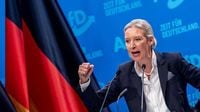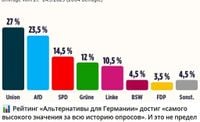The political landscape in Germany is undergoing a significant shift, as the Alternative for Germany (AfD) party reaches unprecedented heights in popularity, according to the latest INSA poll. With a rating of 23.5%, the AfD has not only marked its highest support level ever recorded but has also narrowed the gap with the ruling CDU/CSU to just 3.5 percentage points.
As reported by Bild, Hermann Binkert, the head of the Institute for Public Opinion Research, confirmed that this is the highest figure ever noted for the AfD in INSA polls. The surge in support for the ultra-right party comes amid ongoing negotiations between the CDU/CSU and the Social Democratic Party of Germany (SPD) to form a coalition government, reflecting a growing discontent among voters with the traditional parties.
In recent weeks, the political dynamics have been shifting, with the AfD capitalizing on the perceived failures of the current administration to address pressing issues. The SPD, currently in negotiations with the CDU/CSU, has seen its support dip to 14.5%, while the Greens and the Left parties hold 12% and 10.5%, respectively. Meanwhile, the Free Democratic Party (FDP) has seen a slight increase, reaching 3.5%.
"Analysis shows that the maximum potential of the AfD could reach 30.5%," Binkert added, indicating that there may be more room for growth for the party if current trends continue. This potential rise is particularly noteworthy given the backdrop of the ongoing conflict in Ukraine, where the AfD has maintained a critical stance towards the government’s position and policies.
The increasing popularity of the AfD may also be attributed to its strong messaging on national identity and immigration issues, which resonate with a significant portion of the electorate. As the CDU/CSU and SPD grapple with coalition negotiations, the AfD's rise poses a challenge to the traditional political order in Germany.
While the CDU/CSU currently leads with 27% support, the party's ability to effectively address voter concerns will be crucial in determining whether they can maintain their position or if the AfD will continue to gain traction. The latest INSA poll indicates that the CDU/CSU has a potential voter base of 42%, while the SPD has a substantial potential of 39.5%, suggesting that if they can resolve pressing issues swiftly, their ratings could rebound.
Despite the AfD's rise, the political landscape remains complex. The Greens have improved their standing slightly, now at 12%, while the Left party has held steady at 10.5%. Other parties combined have garnered 4.5%, reflecting a fragmented political environment where no single party dominates.
The implications of these shifting numbers are significant as Germany approaches future elections. The AfD's growing support could lead to a realignment of political power, challenging the long-standing dominance of the CDU/CSU and SPD. As Binkert noted, the potential for the AfD to reach 30.5% indicates that many voters are reconsidering their allegiances, which could reshape the future of German politics.
In conclusion, the current political climate in Germany is marked by a notable rise in support for the AfD, as traditional parties struggle to maintain their foothold. The coming weeks and months will be critical as parties navigate coalition negotiations and respond to voter concerns. The outcome could redefine the political landscape in ways not seen in recent history.





